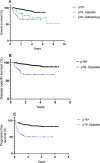Clinical characteristics and treatment outcome in p16 negative anal cancer
- PMID: 40336180
- PMCID: PMC12067988
- DOI: 10.2340/1651-226X.2025.42498
Clinical characteristics and treatment outcome in p16 negative anal cancer
Abstract
Background: Anal squamous cell carcinoma (ASCC) is linked to human papillomavirus infection with p16 being positive in about 85% of cases. Overall survival (OS) of ASCC is 60%-80%. Prognosis in p16 negative (p16-) ASCC is worse with an OS of 30%-60%. It is important to elucidate differences in p16+ and p16- ASCC characteristics and outcome.
Methods: Consecutive ASCC patients (n = 380) treated with curative intent in Uppsala 2017-2022 were reviewed and analyzed retrospectively. A cohort of p16- patients (n = 30) from Gothenburg was included as a validation cohort.
Results: Ninety-one per cent (n = 347) were p16+ and 9% (n = 33) p16-. Median follow-up was 33 months (range 4-78). p16- status was associated with higher age (≥65 years; p = 0.03), comorbidity (p = 0.03), male sex (p = 0.001) and perianal localization (p < 0.001). At 3 years progression free survival was 50% and 81% (p <0.0001) and OS 60% and 89% (p < 0.0001) for p16- and p16+ patients, respectively. Male sex, advanced T-stage (T3-4), N+ disease, advance treatment and p16- status were associated with inferior OS (p = 0.01 - p < 0.0001). In the p16- subgroup, advanced T-stage and intensive treatment were negative prognostic factors for OS (p = 0.007 and 0.009, respectively) but no clinical characteristic predicted persistent disease. The p16- validation cohort essentially confirmed the findings from the main cohort.
Interpretation: p16- ASCC is a disease subset with specific clinical features and poor prognosis in need of improved treatment.
Conflict of interest statement
The authors report there are no competing interests to declare.
Figures


Similar articles
-
Prognostic Relevance of HPV Infection and p16 Overexpression in Squamous Cell Anal Cancer.Int J Radiat Oncol Biol Phys. 2015 Nov 15;93(4):819-27. doi: 10.1016/j.ijrobp.2015.08.004. Epub 2015 Aug 7. Int J Radiat Oncol Biol Phys. 2015. PMID: 26530750
-
Prognostic value of high-risk human papillomavirus DNA and p16INK4a immunohistochemistry in patients with anal cancer: An individual patient data meta-analysis.Eur J Cancer. 2021 Nov;157:165-178. doi: 10.1016/j.ejca.2021.07.041. Epub 2021 Sep 10. Eur J Cancer. 2021. PMID: 34517306
-
Influence of human papillomavirus and p16(INK4a) on treatment outcome of patients with anal cancer.Radiother Oncol. 2014 Dec;113(3):331-6. doi: 10.1016/j.radonc.2014.11.013. Epub 2014 Nov 22. Radiother Oncol. 2014. PMID: 25465729
-
A Systematic Review and Meta-Analysis of Prognostic Biomarkers in Anal Squamous Cell Carcinoma Treated With Primary Chemoradiotherapy.Clin Oncol (R Coll Radiol). 2019 Dec;31(12):e1-e13. doi: 10.1016/j.clon.2019.06.013. Epub 2019 Jul 10. Clin Oncol (R Coll Radiol). 2019. PMID: 31301958
-
Chemoradiotherapy for anal cancer: are we as good as we think?Strahlenther Onkol. 2019 May;195(5):369-373. doi: 10.1007/s00066-019-01444-7. Epub 2019 Apr 1. Strahlenther Onkol. 2019. PMID: 30937508 Review. English.
References
MeSH terms
Substances
LinkOut - more resources
Full Text Sources
Medical
Miscellaneous

